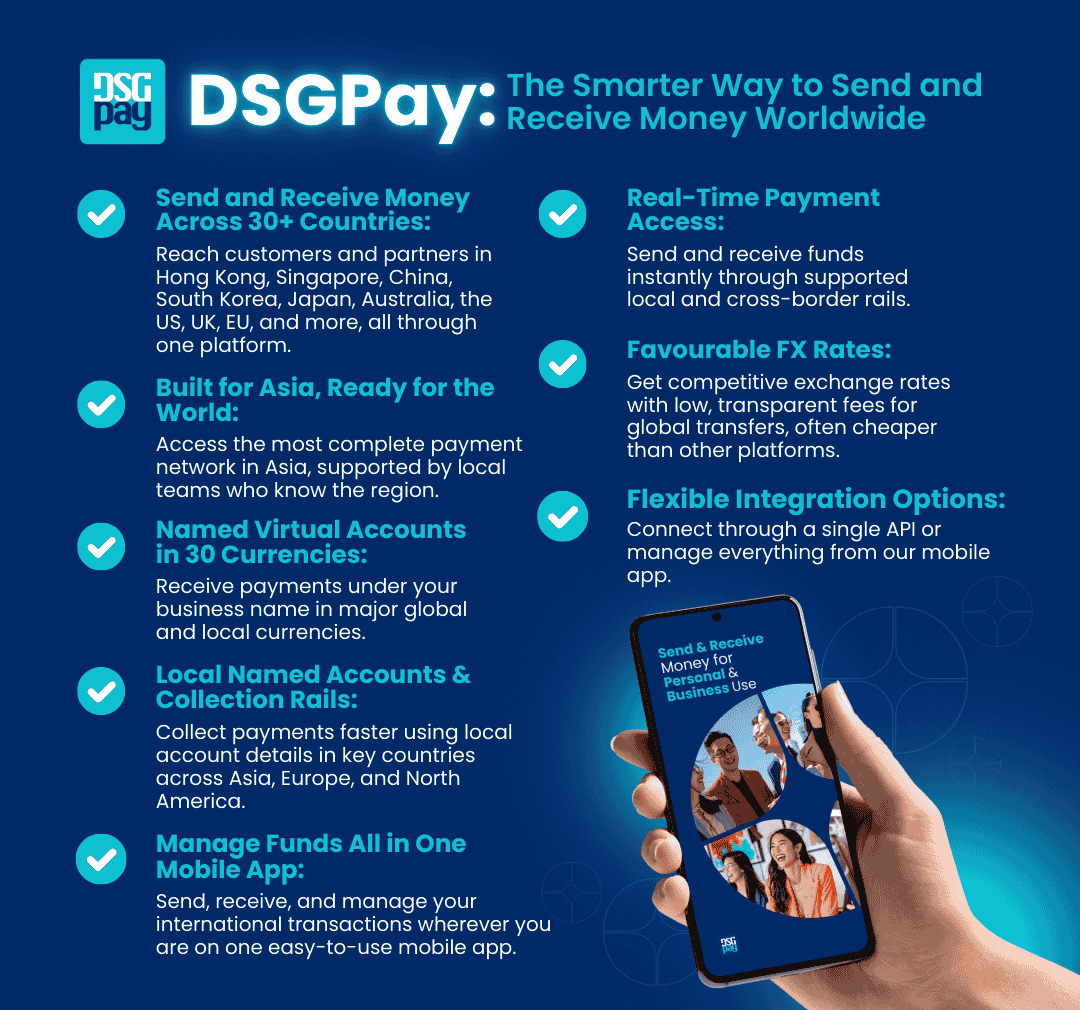There are many advantages for foreign entrepreneurs looking to start a business in Hong Kong.
This includes gaining access to Asia-Pacific markets with minimal hassle, its pro-business policies, a fast company setup process, and more.
To help, this guide will cover all the practical steps foreigners need to know about how to start a business in Hong Kong, alongside helpful resources to give you the best advantage.
Table of Contents
Key Takeaways
- When a foreigner wants to start a business in Hong Kong, they have full business ownership rights even if they’re operating remotely.
- There are multiple structures a business can be made from in Hong Kong. They are the private limited liability companies, sole proprietorships, partnerships, branch offices, and representative offices.
- A foreigner requires little to no capital to create a business in Hong Kong. The business owner only has to pay the required authority fees and tender his proof of payment to continue registering his company.
- Following the right employment laws, establishing the correct banking and financial setup, and obtaining the necessary work permits and licenses are key steps in starting a business in Hong Kong.
Why Start a Business in Hong Kong?
Hong Kong ranks among the easiest places in the world to start and operate a business due to several key factors. They are:
- Hong Kong’s Strategic Location: Hong Kong is situated at the heart of Asia, acting as a gateway to Mainland China and the broader Asia-Pacific markets. It also has excellent ports, airports, and logistical infrastructure.
- Competitive Tax Regime: Corporate profits are taxed at a flat rate of 16.5%, with no VAT, sales tax, or withholding taxes on dividends and interest. This makes it highly tax-efficient.
- No Foreign Ownership Restrictions: Foreign entrepreneurs can own 100% of their business without the need for a local partner.
- Efficient Business Registration: The company incorporation process is online-enabled, fast, transparent, and inexpensive compared to many other jurisdictions.
- Rule of Law and IP Protections: Hong Kong maintains a robust legal system with strong protections for investors, contracts, and intellectual property.
- Highly Skilled Workforce and Services: A deep pool of financial, professional, logistics, and technology services supports businesses efficiently.
Understanding these advantages is the first step to appreciating why Hong Kong remains compelling for foreign business owners in 2025.

Step-by-Step Process to Register Your Business in Hong Kong
To start your business in Hong Kong as a foreigner, you have to go through a procedure to register your business. They are:
Step 1: Prepare the Key Requirements Before Registration
Starting a business in Hong Kong as a foreigner requires adhering to several foundational requirements. They are:
- Directorship: At least one director is mandatory, who can be an individual or a corporate entity. There is no requirement for directors to be Hong Kong residents or citizens.
- Company Secretary: A company secretary is mandatory and must be a natural person residing in Hong Kong or a Hong Kong-incorporated corporate body (not a branch office).
- Shareholders: A minimum of one shareholder is required for a foreign business. This shareholder could be a foreign individual or a corporate entity with no residency limitations.
- Registered Office: A physical address in Hong Kong is required as the registered office. Virtual office services are also accepted, but the business must use a physical address, not a P.O. Box, and the address must not be located outside of Hong Kong.
- Financial Requirements: Officially, there is no minimum capital requirement to start a business in Hong Kong, though 1 HKD is typically the minimum nominal capital and should be stated in the Articles of Association.
These requirements make Hong Kong accessible and straightforward for foreign entrepreneurs.
Step 2: Choose and Reserve a Company Name
Choose a unique and compliant company name. This name must be unique and cannot be the same as any other name already registered in the Companies Registry.
To know if your chosen name is acceptable, you can check the index kept by the Companies Registry through the Companies Registry e-Services Portal.
Step 3: Appoint or Select Relevant Personnel
Choose or select a director, shareholder, and company secretary. The director could be local or foreign, the same as the shareholder, who could be a person or a corporate entity.
On the other hand, it is important that the company secretary is a Hong Kong resident if you’re hiring as an individual, or it should be a Hong Kong-incorporated company if you’re hiring a corporate secretary.
Step 4: Prepare Incorporation Documents
Before submitting your application, prepare the following documents:
- Articles of Association (AA)
- Form NNC1 (Incorporation form for company limited by shares) or Form NNC1G (Incorporation form for companies not limited by shares)
- Notice to Business Registration Office (IRBR1)
- Supporting Details: Include identification documents for directors, shareholders, and the company secretary, along with a clear description of your business activities.
Step 5: Submit the Incorporation Application
File your incorporation application with the Hong Kong Companies Registry. This can be done either online or in person. The processing time for this stage is typically completed within 1 to 5 business days, provided all the required documents are in order.
Step 6: Obtain Business Registration Certificate
Within one month of your business starting operations, you are to apply for your Business Registration Certificate with the Inland Revenue Department. This certificate is your proof of tax registration, and it must be renewed annually.
Step 7: Open a Corporate Bank Account
Foreign-owned companies can open accounts with Hong Kong’s local or international banks. To make the account opening process smooth and compliant, keep these key points in mind:
- Prepare all required documents, such as incorporation certificates, business registration certificates, company resolutions, directors’ passports, proof of address, and business plan.
- Engage a local service provider with experience in banking procedures to guide you through the onboarding process.
- Be transparent about your business activities and funding sources, clarity builds trust with financial institutions.
Digital and Fintech Account Alternatives
Alongside traditional banks, Hong Kong now has several digital and fintech options that serve businesses needing flexible payment solutions.
- Digital Banks such as ZA bank and Airstar bank provide online corporate accounts.
- Fintech Providers such as Airwallex and Wise offer multi-currency business accounts designed for cross-border payments and international transactions.
These alternatives complement conventional banking services and can help businesses manage local and global operations more efficiently.
Step 8: Acquire Necessary Business Licenses
Depending on the type of business you’re opening, permits and business licenses may be required.
For example, a food/restaurant business would require a General Restaurant Licence from the Food and Environmental Hygiene Department (FEHD) alongside other health and safety hygiene permits.
Step 9: Maintain Ongoing Statutory Compliance
After incorporation, every Hong Kong company should maintain proper corporate governance activities. This includes:
- Holding annual general meetings (AGMs) and filing annual returns.
- Preparing and auditing financial statements each year through a Hong Kong Certified Public Accountant (CPA).
- Renewing the Business Registration Certificate (BRC) annually or every three years.
This must be done even for companies claiming an offshore tax exemption (i.e., no Hong Kong-sourced income).

Types of Business Entities Available for Foreigners
Foreign entrepreneurs have several options when deciding on the legal structure for their prospective businesses in Hong Kong. These options are:
- Private Limited Company (Ltd)
- The most common and preferred business structure in Hong Kong. It offers limited liability, meaning the owner’s personal assets are protected from the business’s debts.
- It can also benefit from all tax benefits and concessions available to any fully incorporated business, such as the two-tier corporate tax rate, as well as benefits like the Closer Economic Partnership Arrangement (CEPA), which is a free trade agreement with Mainland China.
- Sole Proprietorship
- This entity is simple to set up but offers no liability protection; therefore, it is a less common option among foreigners.
- A sole proprietorship is usually used by foreigners with an HK residence status, and it is a more common option among freelancers.
- Partnership
- This type of entity involves shared ownership among multiple parties. This structure is suitable for two or more owners who share profits and liabilities. However, the liability protection of the business depends on the type of partnership established.
- The types of partnerships available in Hong Kong are:
- General Partnerships (GP): This structure holds all general partners liable for the business’s debts and obligations, and they are also responsible for each other’s business-related actions.
- Limited Partnerships (LP): This structure consists of at least one general partner, who has unlimited liability in the business, and one or more limited partners, whose liabilities are limited to their unpaid share capital or investments.
- Limited Liability Partnerships (LLP): In this partnership, all partners enjoy protection for their personal assets from the firm’s debts. However, this type of partnership is restricted to certain professional practices, such as law and accounting firms and is not available for general commercial businesses in Hong Kong.
- Branch Office
- This entity is mainly used by companies that are headquartered in other countries and are looking to set up a base in Hong Kong.
- These offices are not considered a separate entity from the parent company; therefore, the parent company assumes full responsibility for any debts or liabilities incurred by the company.
- Within one month of its creation, a branch office must be registered under the Companies Registry as a Registered Non-Hong Kong Company. This registration also allows the branch office to leverage the credit rating of the parent company.
- Representative Office
- This business entity is the type that does not engage in any form of profit-making activity.
- It serves as the presence of a business in a foreign country for research purposes (market research, experimental research, etc.).
- This structure is mainly used by foreign companies looking to test out a location/country before expanding into the country.
For foreigners, forming a Private Limited Company is typically the best choice due to its flexibility, credibility, and regulatory simplicity.
Cost of Starting a Business in Hong Kong (2025 Estimates)
Although a foreign business owner typically requires little to no capital to establish their business, there are certain fees that must be paid at various stages during the registration process. They are:
| Expense Category | Estimated Cost (USD) |
| Government Incorporation Fees | $200–$300 |
| Company Secretary & Registered Address | $400–$800/year |
| Accounting & Tax Filing | $500–$1,500/year |
| Traditional/Digital Bank Account Opening | Free–$500 |
Tip: Business owners should keep all payment receipts and invoices as part of your company’s statutory records. These documents may be required during annual audits or tax reviews.
Taxes in Hong Kong for Foreign-Owned Companies
Hong Kong is known as one of the best countries to do business. Why? It has some of the most relaxed tax laws for both individuals and companies compared to any other country in the world.
These laws cover:
- For corporate businesses, the first 2 million HKD of profits is taxed at 8.25%. Profits above that amount will be subjected to a higher tax rate of 16.5%.
- For unincorporated businesses (i.e., partnerships and sole proprietorship businesses), the two levels of funds are taxed at 7.5% and 15% respectively.
- Tax on salaries (for Employees and Directors) is taken at a progressive rate, ranging from 2% to 17%. However, the maximum tax will be limited to a tax rate of 15% on the first HK$5 million of net income and 16% on the remaining amount.
- There is also a 15% charge on property tax.
Aside from those, other forms of taxes such as:
| Tax Type | Rate |
| Tax on Dividends | Not Charged |
| Tax on Capital Gains | Not Charged |
| Sales Tax or VAT | Not Charged |
| Withholding Tax on Foreign Payments | Not Charged |
| Estate Tax | Not Charged |
Additionally, another benefit of setting up a business in Hong Kong is its free trade policy, as it follows a territorial taxation system. This means income earned outside HK is not taxed. A significant advantage for online/service/export businesses.
The territory’s broad network of Double Taxation Agreements helps foreign investors avoid being taxed twice. Companies must keep audited financial statements and comply with annual filing deadlines.
Employment Laws Governing Foreign Businesses in Hong Kong
Employment laws for foreign businesses seeking to hire local workers in Hong Kong are governed by the Hong Kong Employment Ordinance. These laws are flexible, but they require compliance with labour ordinances, mandatory provident funds (pension contributions), and visa regulations for foreign hires.
This legislation sets mandatory standards for employee rights, benefits, and termination procedures. While foreign employers can choose a different governing law in their contract, mandatory provisions of the Hong Kong Employment Ordinance will still apply to work performed in Hong Kong. Employers must also comply with immigration requirements for foreign nationals, such as securing necessary visas and work permits.
Visa and Work Permit Complement for Foreign Entrepreneurs
Foreigners can fully own and operate a business in Hong Kong without local residency. However, those who wish to work or reside in the city must obtain a valid visa.
- Foreigners who plan to manage their business locally can apply for an Investment as Entrepreneurs Visa under the General Employment Policy (GEP).
- Visitors from over 170 countries and territories can stay for 7 to 180 days to see Hong Kong as an attractive destination for global talent and enterprises.
- For longer-term work and residency, Hong Kong offers a variety of visa options under its Investment as Entrepreneurs route and various Talent Admission Schemes, including the Capital Investment Entrant Scheme (CIES), which was relaunched in March 2024.
Tips to Successfully Start Your Business in Hong Kong
Here are a few tips that can assist you on your way as you try to start up a business in Hong Kong as a foreigner.
- Hire qualified local personnel. This includes the company secretaries and accountants. This ensures your business complies with local employment polices and regulations.
- Consider virtual office providers for your registered business address to reduce costs initially. This is if your proposed business does not require a physical base location to operate.
- Utilise government resources like InvestHK for advisory and networking. This helps you gain more up-to-date information from the Hong Kong government about any changes to their polices.
- Respect Local Business Culture. Hong Kong values professionalism, punctuality, and trust in business relationships. When building business relationships in Hong Kong, a positive relationship with the locals surrounding your business ensures positive reputation growth through word of mouth.
- Ensure delays in payments are never a possibility, as it improves the relationship and trust between the business and the suppliers.
By going along with each of the above steps and understanding all the other obligations, it should be easy for a foreign entrepreneur to start a business in Hong Kong and manage it successfully from their home location abroad.
Final Thoughts
Starting a business in Hong Kong as a foreigner is a fast, affordable, and strategically global choice due to its transparent regulations, simple tax system, zero currency controls, and straightforward compliance requirements.
For those looking to expand across Asia or manage multi-currency transactions with ease, Hong Kong offers the ideal foundation for long-term business growth.
How DSGPay Streamlines Local and Cross-border Payments for Foreign Businesses in Hong Kong
A big issue for start-up businesses and large corporations is usually disbursing payments to overseas suppliers or foreign employees.
DSGPay is an online payment solution designed to facilitate rapid payment settlement for businesses in Hong Kong and worldwide.

Why Use DSGPay?
- Named Virtual HKD Accounts: Build trust and simplify reconciliation by offering HKD account details that reflect your registered business name, ideal for invoicing and client payments.
- Hold and Manage 30+ Currencies: Send, hold, or receive HKD, as well as any of 30 other major currencies, including USD, EUR, KRW, and more, all from a single dashboard.
- Low Fees and Competitive FX Rates: DSGPay operates with transparent pricing, offering low currency conversion fees and competitive FX rates for every transaction.
- Instant Settlements Using Local Rails: By leveraging local payment rails, DSGPay can complete cross-border transactions within minutes, ensuring seamless business operations.
- Seamless API Integration: DSGPay facilitates easy payroll disbursements by integrating with various accounting and bursary software or tools to handle local or international employee or supplier payouts.
With DSGPay, a foreign-owned business in Hong Kong has all the flexibility it needs to ensure the swift delivery of its cross-border payments.




